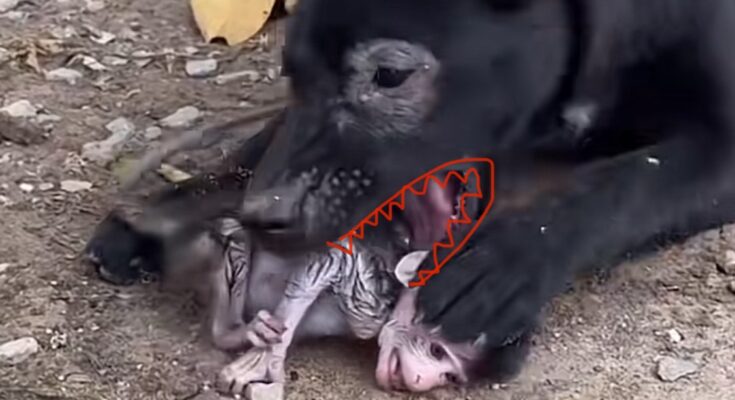In a heartbreaking and rare incident, a small monkey tragically lost its life after being bitten by a dog. This unfortunate event has drawn attention to the vulnerability of wild and domesticated animals when they come into contact, often unintentionally, with each other. The incident highlights the unpredictable nature of animal interactions and serves as a reminder of the potential risks involved when different species coexist in close proximity.
The Incident: A Brief Overview
The incident occurred in a rural area, where the small monkey, which had ventured close to a residential property, was bitten by a dog. While the monkey’s species has not been confirmed, it appeared to be a young primate, possibly a macaque or capuchin, which are common in such areas. The dog, a large breed with a strong bite force, immediately reacted when it saw the monkey, leading to the fatal attack.
Despite the efforts of the pet’s owners to separate the animals, the monkey’s injuries were severe, and it died almost instantly. The dog, likely acting out of instinct rather than aggression, was a family pet and had never shown violent behavior before. However, the nature of the attack brought to light the complexities of human-animal interactions in environments where animals are both wild and domesticated.
Understanding Animal Instincts: Why Did the Dog Attack?
It is important to understand that dogs, particularly large breeds, have highly developed predatory instincts. These instincts can be triggered by the sight or movement of small animals, such as monkeys, rabbits, or even squirrels. Although dogs may appear friendly, especially in familiar settings, their behavior can be unpredictable when faced with unfamiliar stimuli.
Primates, on the other hand, are generally non-aggressive but can feel threatened when cornered or approached by predators. In this case, the small monkey’s proximity to the dog might have triggered a defensive reaction, making the situation even more volatile. The interaction between the two animals, without any prior exposure to one another, turned tragic due to their contrasting instincts.
Consequences for Both Animals: The Tragedy and Its Aftermath
This incident left the dog’s owners devastated, as they had never anticipated that their pet could be involved in such a tragedy. The family, who had raised the dog for several years, had always trusted it around other animals. The sudden attack was not only shocking but also left them grappling with questions about how to prevent similar incidents in the future.
For the monkey, the outcome was fatal. In wild settings, animals are generally more capable of avoiding predators, but in domestic environments where they are exposed to dogs or other pets, their survival instincts may be hindered by their unfamiliarity with such threats. The death of the monkey was also a tragic loss for the local ecosystem, especially if the species involved played a specific role in its habitat, such as seed dispersal or pest control.
A Lesson in Caution: Prevention and Responsible Pet Ownership
This incident underscores the need for increased awareness regarding the safety of animals when interacting with each other, particularly when wild animals and pets are involved. Pet owners must be responsible for monitoring their animals’ behavior, especially if they live in areas where wildlife may wander close to human settlements. It is essential for dog owners to ensure that their pets are properly trained and socialized to reduce the likelihood of aggressive behavior.
Likewise, local authorities and wildlife organizations can play an important role in educating the public about the potential risks associated with human-animal interactions. Creating safe environments where animals, both domestic and wild, can coexist without the threat of harm is crucial for preventing similar tragedies.
Conclusion: A Call for Awareness and Responsibility
The untimely death of the small monkey due to a dog bite is a somber reminder of the fragile relationship between humans, their pets, and the wild animals that share our world. It calls for a more careful and respectful approach to pet ownership and wildlife conservation. By taking steps to understand the behavior of animals, being proactive in preventing conflicts, and advocating for responsible pet practices, we can ensure that such tragedies are avoided in the future.



